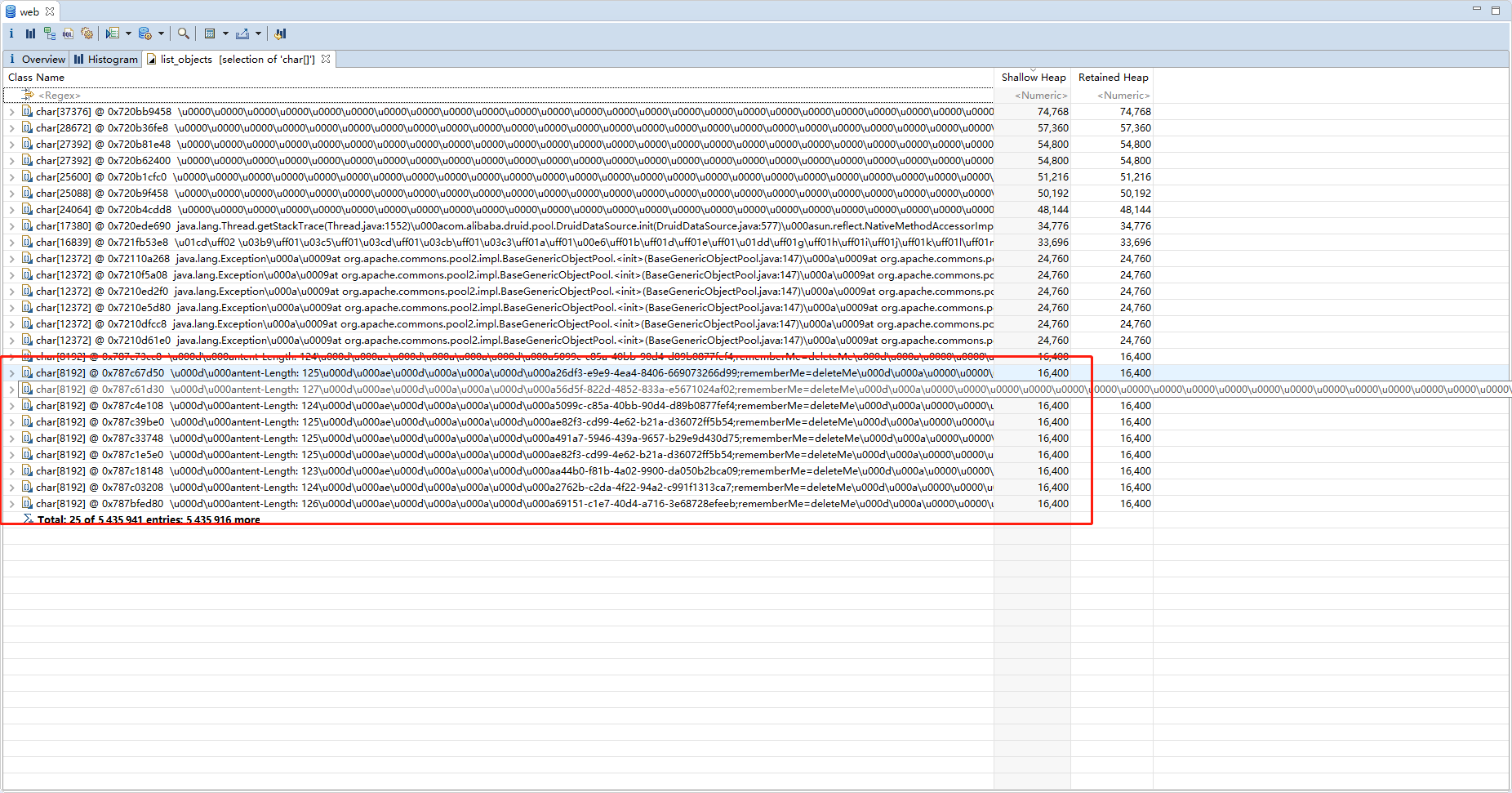前段时间公司项目运行一段时间 cpu 就占用100%,然后服务就不可用了, 但是那段时间并发也没有升高,数据库,缓存也很正常,弄了很久都没有头绪。于是领导让我来解决这个问题。
登陆服务器 先用top 命令查看cpu 占用
top发现 java 进程确实占用cpu 很高,继续查看java 内线程的cpu 占用
top -H -p 4536找到两个线程占用cpu 很高,然后打印java 程序的线程,找到这两个线程的信息(线程号需要转成16进制)
jstack 4536> 4536.txt发现这两个线程都是 gc 操作。有可能是jvm 内存占用满了,频繁full gc 导致的。
下载 阿里的 arthas 来看一下gc 的情况
https://github.com/alibaba/arthas/blob/master/README_CN.md
发现老年代都占用100%了,果然是频繁的full gc 导致的。而且full gc 都无法降低老年代的内存
打印一下 堆的信息
jmap -heap 4536
jstack 4536> 1.log实时打印gc 情况
jstat -gc 4536 3000手动fullgc 也不行
jmap -histo:live 4536发现有一个user对象占用很多,比较诡异,然后把堆的dump 对象下载下来,在本地用mat 查看
jmap -dump:live,format=b,file=4536 4536https://www.eclipse.org/mat/

右键char[] 打开char[],查看里面的对象
 发现不仅user 对象比较多,而且char[] 里面有一个 对象也比较多,带有cookie 和 deleteMe 字段,这个是shiro 框架里面的内容。 我们使用了 shiro 和shiro-redis 作为权限控制框架。 有可能是这两个框架导致的。最后在网上找的果然是shiro-redis 导致的问题
发现不仅user 对象比较多,而且char[] 里面有一个 对象也比较多,带有cookie 和 deleteMe 字段,这个是shiro 框架里面的内容。 我们使用了 shiro 和shiro-redis 作为权限控制框架。 有可能是这两个框架导致的。最后在网上找的果然是shiro-redis 导致的问题
http://www.findsrc.com/java/detail/8688
我们在github找到框架的源码
https://github.com/alexxiyang/shiro-redis
发现果然用到了threadlocal,作者的说法是shiro 在鉴权的时候频繁读取session 信息,所以用到了threadlocal,减小redis 的读取压力。所以可能就是这个原因导致的内存泄漏。
/**
* doReadSession be called about 10 times when login.
* Save Session in ThreadLocal to resolve this problem. sessionInMemoryTimeout is expiration of Session in ThreadLocal.
* The default value is 1000 milliseconds (1s).
* Most of time, you don't need to change it.
*/最终解决办法。
升级shiro-redis 至 3.2.3
shiroconfig在使用redissessiondao 时禁用threadLocal
@Bean
public RedisSessionDAO sessionDAO(){
RedisSessionDAO sessionDAO = new RedisSessionDAO(); // crazycake 实现
sessionDAO.setSessionInMemoryEnabled(false);
sessionDAO.setRedisManager(redisManager());
sessionDAO.setSessionIdGenerator(sessionIdGenerator()); // Session ID 生成器
return sessionDAO;
}
以下为shiro-redis源码
package org.crazycake.shiro;
import org.apache.shiro.session.Session;
import org.apache.shiro.session.UnknownSessionException;
import org.apache.shiro.session.mgt.eis.AbstractSessionDAO;
import org.crazycake.shiro.exception.SerializationException;
import org.crazycake.shiro.serializer.ObjectSerializer;
import org.crazycake.shiro.serializer.RedisSerializer;
import org.crazycake.shiro.serializer.StringSerializer;
import org.slf4j.Logger;
import org.slf4j.LoggerFactory;
import java.io.Serializable;
import java.util.*;
public class RedisSessionDAO extends AbstractSessionDAO {
private static Logger logger = LoggerFactory.getLogger(RedisSessionDAO.class);
private static final String DEFAULT_SESSION_KEY_PREFIX = "shiro:session:";
private String keyPrefix = DEFAULT_SESSION_KEY_PREFIX;
private static final long DEFAULT_SESSION_IN_MEMORY_TIMEOUT = 1000L;
/**
* doReadSession be called about 10 times when login.
* Save Session in ThreadLocal to resolve this problem. sessionInMemoryTimeout is expiration of Session in ThreadLocal.
* The default value is 1000 milliseconds (1s).
* Most of time, you don't need to change it.
*/
private long sessionInMemoryTimeout = DEFAULT_SESSION_IN_MEMORY_TIMEOUT;
private static final boolean DEFAULT_SESSION_IN_MEMORY_ENABLED = true;
private boolean sessionInMemoryEnabled = DEFAULT_SESSION_IN_MEMORY_ENABLED;
// expire time in seconds
private static final int DEFAULT_EXPIRE = -2;
private static final int NO_EXPIRE = -1;
/**
* Please make sure expire is longer than sesion.getTimeout()
*/
private int expire = DEFAULT_EXPIRE;
private static final int MILLISECONDS_IN_A_SECOND = 1000;
private IRedisManager redisManager;
private RedisSerializer keySerializer = new StringSerializer();
private RedisSerializer valueSerializer = new ObjectSerializer();
private static ThreadLocal sessionsInThread = new ThreadLocal();
@Override
public void update(Session session) throws UnknownSessionException {
this.saveSession(session);
if (this.sessionInMemoryEnabled) {
this.setSessionToThreadLocal(session.getId(), session);
}
}
/**
* save session
* @param session
* @throws UnknownSessionException
*/
private void saveSession(Session session) throws UnknownSessionException {
if (session == null || session.getId() == null) {
logger.error("session or session id is null");
throw new UnknownSessionException("session or session id is null");
}
byte[] key;
byte[] value;
try {
key = keySerializer.serialize(getRedisSessionKey(session.getId()));
value = valueSerializer.serialize(session);
} catch (SerializationException e) {
logger.error("serialize session error. session id=" + session.getId());
throw new UnknownSessionException(e);
}
if (expire == DEFAULT_EXPIRE) {
this.redisManager.set(key, value, (int) (session.getTimeout() / MILLISECONDS_IN_A_SECOND));
return;
}
if (expire != NO_EXPIRE && expire * MILLISECONDS_IN_A_SECOND < session.getTimeout()) {
logger.warn("Redis session expire time: "
+ (expire * MILLISECONDS_IN_A_SECOND)
+ " is less than Session timeout: "
+ session.getTimeout()
+ " . It may cause some problems.");
}
this.redisManager.set(key, value, expire);
}
@Override
public void delete(Session session) {
if (session == null || session.getId() == null) {
logger.error("session or session id is null");
return;
}
try {
redisManager.del(keySerializer.serialize(getRedisSessionKey(session.getId())));
} catch (SerializationException e) {
logger.error("delete session error. session id=" + session.getId());
}
}
@Override
public Collection<Session> getActiveSessions() {
Set<Session> sessions = new HashSet<Session>();
try {
Set<byte[]> keys = redisManager.keys(this.keySerializer.serialize(this.keyPrefix + "*"));
if (keys != null && keys.size() > 0) {
for (byte[] key:keys) {
Session s = (Session) valueSerializer.deserialize(redisManager.get(key));
sessions.add(s);
}
}
} catch (SerializationException e) {
logger.error("get active sessions error.");
}
return sessions;
}
@Override
protected Serializable doCreate(Session session) {
if (session == null) {
logger.error("session is null");
throw new UnknownSessionException("session is null");
}
Serializable sessionId = this.generateSessionId(session);
this.assignSessionId(session, sessionId);
this.saveSession(session);
return sessionId;
}
@Override
protected Session doReadSession(Serializable sessionId) {
if (sessionId == null) {
logger.warn("session id is null");
return null;
}
if (this.sessionInMemoryEnabled) {
Session session = getSessionFromThreadLocal(sessionId);
if (session != null) {
return session;
}
}
Session session = null;
logger.debug("read session from redis");
try {
session = (Session) valueSerializer.deserialize(redisManager.get(keySerializer.serialize(getRedisSessionKey(sessionId))));
if (this.sessionInMemoryEnabled) {
setSessionToThreadLocal(sessionId, session);
}
} catch (SerializationException e) {
logger.error("read session error. settionId=" + sessionId);
}
return session;
}
private void setSessionToThreadLocal(Serializable sessionId, Session s) {
Map<Serializable, SessionInMemory> sessionMap = (Map<Serializable, SessionInMemory>) sessionsInThread.get();
if (sessionMap == null) {
sessionMap = new HashMap<Serializable, SessionInMemory>();
sessionsInThread.set(sessionMap);
}
removeExpiredSessionInMemory(sessionMap);
SessionInMemory sessionInMemory = new SessionInMemory();
sessionInMemory.setCreateTime(new Date());
sessionInMemory.setSession(s);
sessionMap.put(sessionId, sessionInMemory);
}
private void removeExpiredSessionInMemory(Map<Serializable, SessionInMemory> sessionMap) {
Iterator<Serializable> it = sessionMap.keySet().iterator();
while (it.hasNext()) {
Serializable sessionId = it.next();
SessionInMemory sessionInMemory = sessionMap.get(sessionId);
if (sessionInMemory == null) {
it.remove();
continue;
}
long liveTime = getSessionInMemoryLiveTime(sessionInMemory);
if (liveTime > sessionInMemoryTimeout) {
it.remove();
}
}
}
private Session getSessionFromThreadLocal(Serializable sessionId) {
if (sessionsInThread.get() == null) {
return null;
}
Map<Serializable, SessionInMemory> sessionMap = (Map<Serializable, SessionInMemory>) sessionsInThread.get();
SessionInMemory sessionInMemory = sessionMap.get(sessionId);
if (sessionInMemory == null) {
return null;
}
long liveTime = getSessionInMemoryLiveTime(sessionInMemory);
if (liveTime > sessionInMemoryTimeout) {
sessionMap.remove(sessionId);
return null;
}
logger.debug("read session from memory");
return sessionInMemory.getSession();
}
private long getSessionInMemoryLiveTime(SessionInMemory sessionInMemory) {
Date now = new Date();
return now.getTime() - sessionInMemory.getCreateTime().getTime();
}
private String getRedisSessionKey(Serializable sessionId) {
return this.keyPrefix + sessionId;
}
public IRedisManager getRedisManager() {
return redisManager;
}
public void setRedisManager(IRedisManager redisManager) {
this.redisManager = redisManager;
}
public String getKeyPrefix() {
return keyPrefix;
}
public void setKeyPrefix(String keyPrefix) {
this.keyPrefix = keyPrefix;
}
public RedisSerializer getKeySerializer() {
return keySerializer;
}
public void setKeySerializer(RedisSerializer keySerializer) {
this.keySerializer = keySerializer;
}
public RedisSerializer getValueSerializer() {
return valueSerializer;
}
public void setValueSerializer(RedisSerializer valueSerializer) {
this.valueSerializer = valueSerializer;
}
public long getSessionInMemoryTimeout() {
return sessionInMemoryTimeout;
}
public void setSessionInMemoryTimeout(long sessionInMemoryTimeout) {
this.sessionInMemoryTimeout = sessionInMemoryTimeout;
}
public int getExpire() {
return expire;
}
public void setExpire(int expire) {
this.expire = expire;
}
public boolean getSessionInMemoryEnabled() {
return sessionInMemoryEnabled;
}
public void setSessionInMemoryEnabled(boolean sessionInMemoryEnabled) {
this.sessionInMemoryEnabled = sessionInMemoryEnabled;
}
public static ThreadLocal getSessionsInThread() {
return sessionsInThread;
}
}
最后
以上就是俏皮指甲油最近收集整理的关于一次java 内存泄漏问题的解决过程的全部内容,更多相关一次java内容请搜索靠谱客的其他文章。








发表评论 取消回复